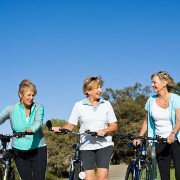 p
p
Apart from not smoking, being physically active is the most powerful lifestyle choice any person can make to improve their health.
So says a new review of existing research published in the December 2010 issue of The International Journal of Clinical Practice.
But just how powerful is it?
According to Leslie Alford, a physiotherapist and lecturer at the University of East Anglia, regular exercise can reduce a person's risk of developing about two dozen physical and mental conditions, including some cancers and dementia, and slow down how quickly their body deteriorates as they age.
“Physical inactivity results in widespread pathophysiological changes to our bodies, he said. “It appears that our bodies have evolved to function optimally on a certain level of physically activity that many of us simply do not achieve in our modern, sedentary lifestyles.”
Alford reviewed 40 papers covering the latest international research published between 2006 and 2010. He concluded how long people live and how healthy they are throughout their lives depends on a complex mix of factors, including their lifestyle, where they live, and even luck. However, he said, everyone has an element of control over some of these factors, including obesity, diet, smoking and the level of physical activity.
While the focus of his study was on men’s health, the messages on physical activity rings loud and clear to both sexes and all age groups, Alford said.
For instance, a growing body of evidence suggests that increasing physical activity can reduce the risk of certain types of cancer, osteoporosis, Type 2 diabetes, depression, obesity and high blood pressure. Current research is expanding the benefits of physical activity in primary cancer prevention and management and there’s an existing association between higher levels of physical activity and lower cancer death rates.
When it comes to specific cancers, the evidence is mixed. Research shows a strong relationship between increased physical activity and a reduction of colon cancer in both sexes. Men who are more active at work—not just sitting at a desk—have lower rates of prostate cancer than their inactive counterparts. Studies also have shown that men who are more active have fewer erectile problems and a decreased risk of dementia in their golden years.
Other cancer studies show physical activity after a diagnosis can aid in recovery and improve outcomes.
So what constitutes “regular exercise”?
Alford says healthy adults between ages 18 and 65 should aim for 150 minutes of moderate intensity physical activity each week, such as 30 minutes of brisk walking, five days a week. And people who undertake more vigorous intensity exercise, such as jogging, should aim for 20 minutes three days a week. And don’t forget those major muscle groups. Healthy adults should aim for two strength-training sessions.
Older people can benefit from exercise to maintain their balance and flexibility. Active people should continue to exercise even when they become middle aged or elderly and those who aren't should increase their physical activity, according to the study.
The importance of choosing to forego or quit smoking, eating a healthy diet and maintaining a healthy weight should not be understated, he said. The more of these healthy traits an individual has, the less likely they are to develop a range of chronic disorders.
Even if people can't give up smoking and maintain a healthy weight, they can still gain health benefits from increasing the amount of regular exercise they take, he said. It doesn't have to be everything or nothing.
The paper, which appears in a special issue on Men's Health, can be accessed free at: http://onlinelibrary.wiley.com/doi/10.111/j.1742-1241.2010.02478.x/pdf
Lynette Summerill is an award-winning writer who lives in Scottsdale, Arizona. In addition to writing about cancer-related issues for EmpowHer, she pens Nonsmoking Nation, a blog following global tobacco news and events.






Add a Comment3 Comments
Ann, What a great story. Give your best to your grandma and tell her she is our hero for setting such good example and being so amazing! Thank you so much for sharing.
November 18, 2010 - 1:53pmThis Comment
When I asked my nearly 106-year-old grandma what her secret to longevity is, she had one word: "Exercise." She has engaged in that activity nearly every day of her life...and still does. Weeks at her home in the summer as kids were not vacation...they were Boot Camp, with requisite 10-mile bike rides before breakfast and swims before lunch! She will soon set foot into her 107th year of life, and she actually seems to be improving! She is amazing! And optimistic, too. She took 21 of us on a cruise this past summer, and on the last day, she assauged my down-trodden mood because the cruise had ended by saying, "Don't worry. We'll do this again in a few years."
November 18, 2010 - 12:56pmThis Comment
Wonderful article. Thanks for the great info.
November 16, 2010 - 11:43amThis Comment